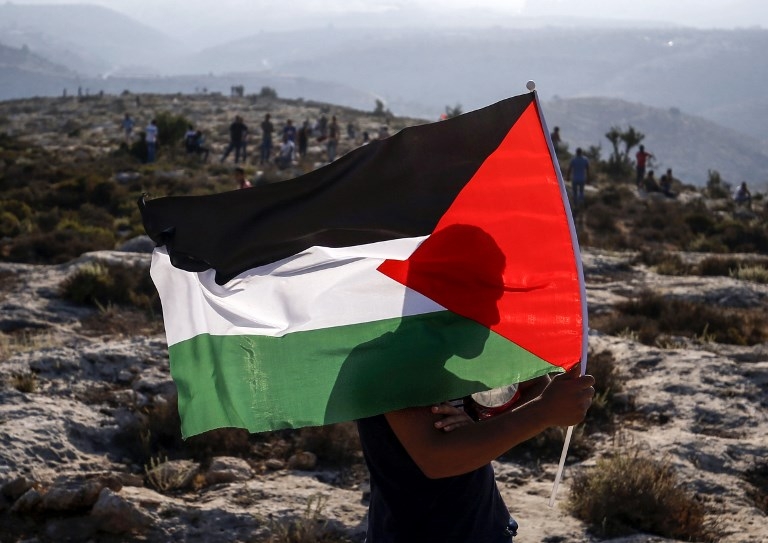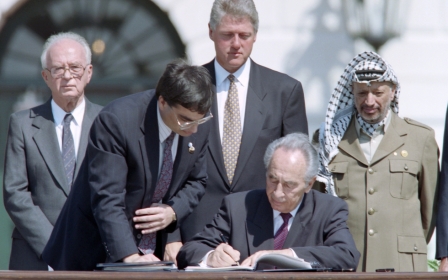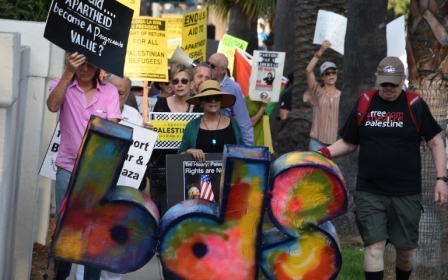Palestinians in Israel: How Oslo isolated us from the liberation struggle

Twenty-five years of Oslo is not a short time. This is a quarter of the lifespan of the ongoing Palestinian struggle for liberation.
In retrospect, Oslo has been as disastrous for Palestinians as the Nakba, the 1948 catastrophe that paved the way for the creation of Israel. Oslo’s legacy might not be as bloody and vicious as the Nakba, but its disastrous results are just as profound.
As much as Oslo has consequences for Palestinians under its doctrine, namely in the West Bank and Gaza, it has also had a huge impact on Palestinians elsewhere, including refugees and those living in present-day Israel.
Left behind
In 1948, Palestinians who managed to remain in their lands woke up to a different reality. They lost their homes, villages, income sources, lands, politics, culture, security and collectivity. Since then, Israel has attempted to complete the ethnic cleansing of Palestinians, if not by forcing them out, then by destroying their identity and depriving them of dignity and rights - but Palestinians have survived.
The Oslo Accords were designed to destroy Palestinian resistance and steadfastness in many ways. For Palestinians within Israel, the deal was designed to leave them behind, not just by Israel, but by their own people. It was the classic strategy of divide and conquer, something at which Israel excels.
Another paradigm strengthened by Oslo is the notion that civil rights are the key issue, rather than national liberation
The Oslo Accords included a number of “permanent status issues” for future negotiations, including prisoners, borders, Jerusalem, refugees, settlements and cooperation with neighbouring states. Palestinian citizens of Israel were not among these issues; rather, Oslo established the paradigm that Palestinians within Israel were an internal Israeli affair, not for the Palestine Liberation Organisation (PLO) or anyone else to intervene in.
Since the 1990s, Palestinians in Israel have shifted to minding their own business. We have gone from grassroots to “professional” activism; from being driven by a cause to being driven by the agenda of international donors; from national liberation to normalising the coloniser.
Political leadership
Another paradigm strengthened by Oslo is the notion that civil rights are the key issue, rather than national liberation.
In a process similar to what happened in Gaza and the West Bank after 1967, foreign funding started to pour into newly formed non-governmental organisations, which have gained more power than political parties.
This is not, of course, all Oslo’s fault. There is a bigger picture and a complex historical process. But we bear internal responsibility - especially our political leadership and parties. Not only have they prioritised winning seats in the Knesset over the legacy of national liberation, but they have also done very little to organise people at the grassroots level, or even to reassess their own outdated politics.
As part of the Oslo process or perhaps as a result of it, Palestinians within Israel lost their ownership of the cause. This may be the most devastating consequence of Oslo.
The Palestinian struggle for liberation has become a cause that is not ours, but one with which we stand in solidarity. We go to Ramallah as solidarity forces, not as owners of the cause. We are invited to Ramallah as “Israel’s experts” who can provide advice - not as people entitled to be part of the decision-making process.
Ending Oslo
The Palestinian Authority (PA) does not represent us, nor does the PLO, which was hijacked by the PA. We have no say in how the PLO should function, nor on the overall Palestinian vision to end the occupation and colonialism.
The Oslo Accords enacted a master plan of divide and conquer against Palestinians - a destruction of collectiveness and a confusion of priorities. Those who write off as narrow-minded calls to end Oslo are wrong; it is the most broad-minded thing we can demand today.
It is in the interests of all Palestinians to reclaim their cause and play a part in shaping a vision towards liberation. After the new nation-state law passed by the Israeli Knesset, which defines Israel as an exclusive state for Jews, the Palestinian leadership within Israel faces a great challenge.
They have unfortunately refused to engage with their electorate in a meaningful process of debate over strategy and agenda. Without this process, we cannot confront the implications of Oslo.
- Abir Kopty is a Palestinian writer and PhD student.
The views expressed in this article belong to the author and do not necessarily reflect the editorial policy of Middle East Eye.
Photo: A protester waves a Palestinian flag during a demonstration in the occupied West Bank on 4 September 2018 (AFP)
New MEE newsletter: Jerusalem Dispatch
Sign up to get the latest insights and analysis on Israel-Palestine, alongside Turkey Unpacked and other MEE newsletters
Middle East Eye delivers independent and unrivalled coverage and analysis of the Middle East, North Africa and beyond. To learn more about republishing this content and the associated fees, please fill out this form. More about MEE can be found here.






